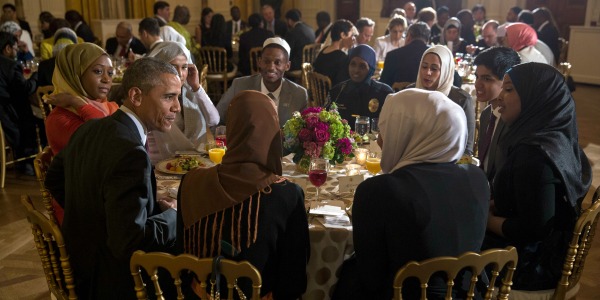President Barack Obama Celebrates Ramadan at White House with Young Muslim American Leaders
|
||
 |
||
| On Monday, June 22, President Barack Obama hosted an Iftar dinner celebrating Ramadan in the East Room of the White House. A selected group Muslim Americans from across the country were invited to attend the banquet, which has become a staple of the Obama presidency. The White House Iftar has become an annual tradition that provides a rare opportunity for the Muslim American community to directly engage with their President and senior level officials. President Obama dined at his table with a selected group of young Muslim leaders, who eagerly discussed pressing issues facing America's Muslim community and highlighted real concerns about the future of Muslims in our country. Some of the guests at the table included Samantha Elauf, who took her discrimination case against Abercrombie & Fitch to the Supreme Court and won; Munira Khalif, who was accepted to all eight Ivy League schools; Kadra Mohamed, the first Somali American Muslim woman in the St. Paul Police Department; Wai Wai Nu, a former Rohingyan political prisoner who advocates against the persecution of Rohingya Muslims; and Riham Osman, Communications Coordinator for the Muslim Public Affairs Council (MPAC). They conveyed to the President their deep belief that we need to go beyond surface level engagement and develop an institutionalized manner of including Muslims Americans in the policy-making apparatus within the Administration. This impressive group explained that the Muslim American community needs the Administration to create a space for Muslims to raise issues that matter to both our community and to the American public. The President was provided with specific recommendations he can pursue and asked to appoint a Muslim to a Cabinet-level position, provide an opportunity for the community to follow up on the issues they care about the most through the development of an advisory committee, and at the very least, appoint a Muslim liaison to Muslim American communities within the Office of Public Engagement. Perhaps the most pressing matter raised with President Obama was the need for his Administration to engage with the Muslim American community on issues that expand beyond national security concerns. One of the major criticisms of the Countering Violent Extremism (CVE) framework is that it singles out Muslims. Instead, they recommended that CVE should aim to include all right-wing extremists groups -- regardless of their faith or political leaning -- that pose a threat to the United States and aim to counter their violent ideologies. The group highlighted Charleston as an opportunity for his Administration to show that CVE applies to different communities, not only the Muslim community. Lastly, they conveyed their deep concern with media biases that contribute to the vilification of the Muslim community and expressed their fear that the portrayal will lead to more hate crimes. The group shared their personal stories of discrimination and how those experiences contributed to their passionate work for the safety of Muslims in this country. "The need to go beyond the White House Iftar and create a space where the leaders of the Muslim American community can engage in regular meetings with the Administration to raise it's concerns has never been greater," stated Riham Osman. "Every major community in America has a process for their engagement and regular meetings with the Administration except the American Muslim community. Access is half of the engagement process. We need to institutionalize engagement." |
 |
|